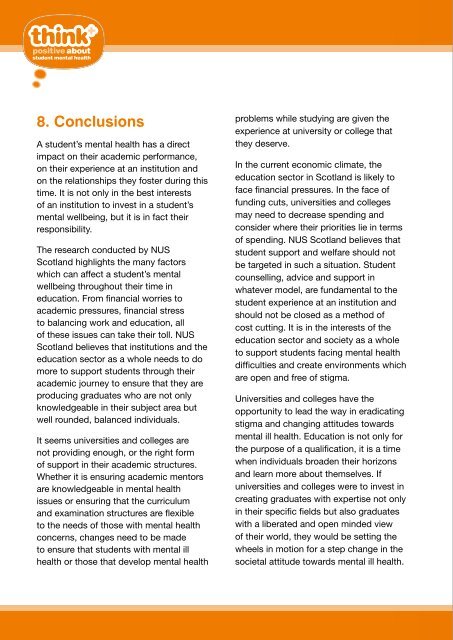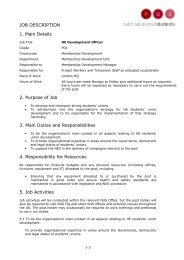Silently Stressed - a survey into student mental wellbeing
Silently Stressed - a survey into student mental wellbeing
Silently Stressed - a survey into student mental wellbeing
Create successful ePaper yourself
Turn your PDF publications into a flip-book with our unique Google optimized e-Paper software.
8. Conclusions<br />
A <strong>student</strong>’s <strong>mental</strong> health has a direct<br />
impact on their academic performance,<br />
on their experience at an institution and<br />
on the relationships they foster during this<br />
time. It is not only in the best interests<br />
of an institution to invest in a <strong>student</strong>’s<br />
<strong>mental</strong> <strong>wellbeing</strong>, but it is in fact their<br />
responsibility.<br />
The research conducted by NUS<br />
Scotland highlights the many factors<br />
which can affect a <strong>student</strong>’s <strong>mental</strong><br />
<strong>wellbeing</strong> throughout their time in<br />
education. From financial worries to<br />
academic pressures, financial stress<br />
to balancing work and education, all<br />
of these issues can take their toll. NUS<br />
Scotland believes that institutions and the<br />
education sector as a whole needs to do<br />
more to support <strong>student</strong>s through their<br />
academic journey to ensure that they are<br />
producing graduates who are not only<br />
knowledgeable in their subject area but<br />
well rounded, balanced individuals.<br />
It seems universities and colleges are<br />
not providing enough, or the right form<br />
of support in their academic structures.<br />
Whether it is ensuring academic mentors<br />
are knowledgeable in <strong>mental</strong> health<br />
issues or ensuring that the curriculum<br />
and examination structures are flexible<br />
to the needs of those with <strong>mental</strong> health<br />
concerns, changes need to be made<br />
to ensure that <strong>student</strong>s with <strong>mental</strong> ill<br />
health or those that develop <strong>mental</strong> health<br />
problems while studying are given the<br />
experience at university or college that<br />
they deserve.<br />
In the current economic climate, the<br />
education sector in Scotland is likely to<br />
face financial pressures. In the face of<br />
funding cuts, universities and colleges<br />
may need to decrease spending and<br />
consider where their priorities lie in terms<br />
of spending. NUS Scotland believes that<br />
<strong>student</strong> support and welfare should not<br />
be targeted in such a situation. Student<br />
counselling, advice and support in<br />
whatever model, are funda<strong>mental</strong> to the<br />
<strong>student</strong> experience at an institution and<br />
should not be closed as a method of<br />
cost cutting. It is in the interests of the<br />
education sector and society as a whole<br />
to support <strong>student</strong>s facing <strong>mental</strong> health<br />
difficulties and create environments which<br />
are open and free of stigma.<br />
Universities and colleges have the<br />
opportunity to lead the way in eradicating<br />
stigma and changing attitudes towards<br />
<strong>mental</strong> ill health. Education is not only for<br />
the purpose of a qualification, it is a time<br />
when individuals broaden their horizons<br />
and learn more about themselves. If<br />
universities and colleges were to invest in<br />
creating graduates with expertise not only<br />
in their specific fields but also graduates<br />
with a liberated and open minded view<br />
of their world, they would be setting the<br />
wheels in motion for a step change in the<br />
societal attitude towards <strong>mental</strong> ill health.

















